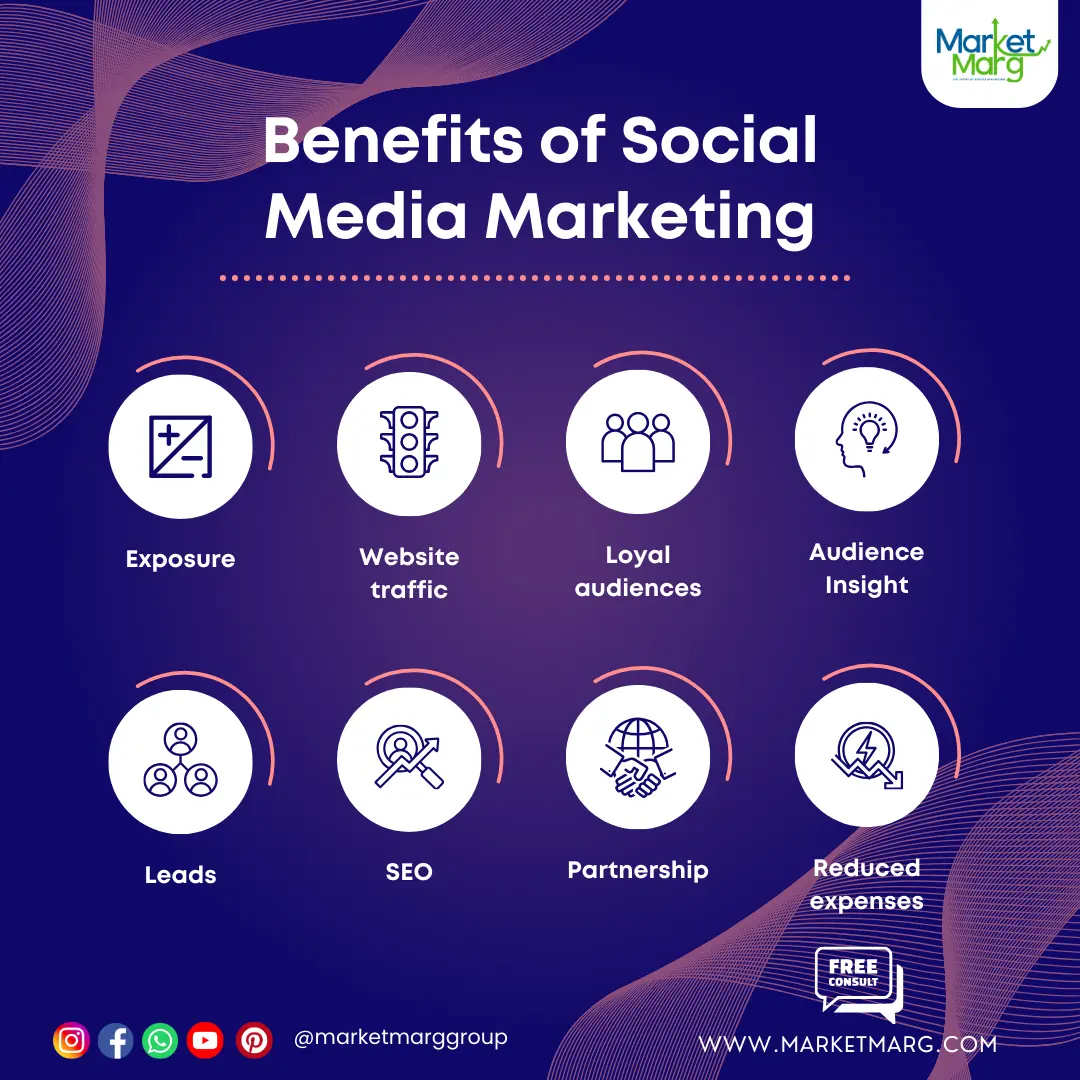The Power of Social Media Marketing: Boost Your Brand Like a Pro
Discover how social media marketing can boost your brand’s visibility, engage your audience, and drive success. Learn top strategies for impactful results.
Social media is everywhere today, from casual scrolling on your phone to targeted ads on your desktop. It’s not just a platform for sharing vacation photos or liking cat memes; it’s an incredibly powerful tool for businesses of all sizes. If you’ve ever wondered how brands seem to grow so quickly and become household names, the answer often lies in social media marketing.
But what exactly makes social media so powerful for marketing? How can you harness this tool to boost your brand and grow like a pro? In this article, we’ll explore the ins and outs of social media marketing, and by the end, you’ll have actionable insights to help your brand succeed.
Table of Contents
| Sr# | Headings |
|---|---|
| 1 | What is Social Media Marketing? |
| 2 | Why Your Brand Needs Social Media Marketing |
| 3 | Benefits of Social Media Marketing |
| 4 | The Key Elements of an Effective Social Media Strategy |
| 5 | Understanding Your Audience: The Foundation of Success |
| 6 | Choosing the Right Platforms for Your Brand |
| 7 | Content is King: What to Post and When to Post It |
| 8 | Engaging with Your Audience: Building Relationships, Not Just Followers |
| 9 | Paid Advertising: Is it Worth It? |
| 10 | Measuring Success: Metrics That Matter |
| 11 | Common Mistakes to Avoid in Social Media Marketing |
| 12 | Case Study: How Social Media Transformed a Small Business |
| 13 | Future Trends in Social Media Marketing |
| 14 | Final Thoughts: Social Media as a Game-Changer |
| 15 | FAQs on Social Media Marketing |
1. What is Social Media Marketing?
Social media marketing refers to the use of social media platforms to promote products, services, or brands. This could include posting content, running advertisements, or engaging directly with users to build brand awareness and drive sales. Unlike traditional marketing, social media marketing is highly interactive, allowing brands to communicate with their audience in real-time.
Think of it as a two-way conversation with your customers. Instead of shouting your message to the masses, social media allows you to talk with your audience and not at them.
2. Why Your Brand Needs Social Media Marketing
In today’s digital age, your brand cannot afford to ignore social media. With billions of people active on platforms like Facebook, Instagram, Twitter, and LinkedIn, social media has become a crucial part of any marketing strategy. If you’re not using social media effectively, you’re leaving money and opportunities on the table.
The beauty of social media is that it gives brands—big or small—a level playing field. Whether you’re a startup or an established company, the right social media marketing can elevate your brand and help you compete in any market.
3. Benefits of Social Media Marketing
So, what can social media marketing do for your brand? Here are some key benefits:
- Increased Brand Awareness: Reach new audiences who may not know about your brand yet.
- Better Customer Engagement: Social media allows you to engage directly with customers, answer their questions, and build trust.
- Cost-Effective Advertising: Compared to traditional advertising methods, social media is incredibly budget-friendly.
- Improved Brand Loyalty: Consistently engaging with your audience builds a loyal customer base.
- More Website Traffic: Social media links can drive more people to your website, increasing conversions.
These benefits combine to create a powerful marketing tool that can propel your brand to new heights.
4. The Key Elements of an Effective Social Media Strategy
Having a presence on social media is one thing, but building an effective social media strategy is where the magic happens. Here are the key elements you need to focus on:
- Clear Goals: What do you want to achieve? More sales, better engagement, or increased brand awareness?
- Content Plan: What type of content will you post? How often will you post?
- Engagement: How will you interact with your audience?
- Performance Tracking: How will you measure success?
Without a strategy, your social media efforts will feel scattered and may not yield the results you want.
5. Understanding Your Audience: The Foundation of Success
Before diving into any campaign, it’s crucial to understand who your audience is. What are their interests, challenges, and needs? The more you know about your audience, the better you can tailor your content to appeal to them.
If your audience primarily consists of young professionals, posting memes all day may not resonate. Similarly, if you’re targeting older demographics, you may want to focus more on educational or value-driven content.
6. Choosing the Right Platforms for Your Brand
Not all social media platforms are created equal, and not all of them will be suitable for your brand. Here’s a quick breakdown:
- Facebook: Great for general brand awareness and customer engagement.
- Instagram: Perfect for visual content and targeting younger audiences.
- Twitter: Best for real-time updates and engaging in trending topics.
- LinkedIn: Ideal for B2B businesses and professional networking.
- TikTok: Focused on short, engaging videos and appeals to Gen Z.
Choosing the right platforms depends on where your audience spends their time and how they prefer to consume content.
7. Content is King: What to Post and When to Post It
When it comes to social media, content is king. The success of your social media marketing depends largely on the quality and relevance of the content you post. Here are some content ideas:
- Informative Blog Posts: Share helpful tips, guides, or news related to your industry.
- Behind-the-Scenes Content: Let your audience peek behind the curtain.
- User-Generated Content: Encourage your followers to create content for you, such as testimonials or product reviews.
- Contests and Giveaways: Engage your audience and incentivize participation.
As for timing, each platform has optimal posting times that can help your content get more visibility.
8. Engaging with Your Audience: Building Relationships, Not Just Followers
Having followers is great, but engagement is where the real value lies. Think of your audience as a community, not just a number. Respond to comments, ask for feedback, and make your followers feel valued.
For example, if someone asks a question about your product, don’t just reply with a canned response. Take the time to engage meaningfully. The stronger your connection with your audience, the more loyal they will become.
9. Paid Advertising: Is it Worth It?
While organic social media marketing is essential, paid advertising can take your strategy to the next level. Platforms like Facebook and Instagram allow you to create targeted ads based on demographics, interests, and behaviors.
Even a small budget can make a significant impact when used strategically. Ads help you reach a larger audience faster and can be tailored to achieve specific goals, like increasing website traffic or boosting sales.
10. Measuring Success: Metrics That Matter
You can’t improve what you don’t measure. To determine whether your social media efforts are working, focus on these key metrics:
- Engagement Rate: How many people are interacting with your posts?
- Follower Growth: Is your audience growing over time?
- Website Traffic: Are your social media posts driving traffic to your site?
- Conversion Rate: How many social media leads are converting into paying customers?
Tracking these metrics regularly will help you understand what’s working and what needs improvement.
11. Common Mistakes to Avoid in Social Media Marketing
It’s easy to make mistakes when you’re just starting with social media marketing. Here are some common pitfalls to avoid:
- Posting Without a Strategy: Random posting leads to inconsistent results.
- Ignoring Negative Feedback: Address criticism, don’t shy away from it.
- Being Too Promotional: Aim for a balance between promotional and engaging content.
- Overlooking Analytics: Failing to measure success means missing out on valuable insights.
12. Case Study: How Social Media Transformed a Small Business
Let’s look at a small business that used social media to transform its brand. A local bakery in New York used Instagram to showcase its artisan bread and behind-the-scenes baking process. They interacted with customers, used hashtags strategically, and ran a few targeted ads. Within six months, their follower count tripled, foot traffic increased, and online orders skyrocketed.
This shows the power of social media when used correctly.
13. Future Trends in Social Media Marketing
Social media is constantly evolving, and staying on top of trends is crucial. Here are some trends to watch:
- Short-Form Video: Platforms like TikTok and Instagram Reels are growing in popularity.
- Social Commerce: Buying directly from social media platforms is on the rise.
- AI and Chatbots: Automating customer service on social media is becoming more common.
- Personalization: Tailoring content to individual users based on their behavior is the future of social media marketing.
14. Final Thoughts: Social Media as a Game-Changer
In conclusion, social media marketing is no longer a luxury—it’s a necessity for brands that want to grow. Whether you’re just starting or looking to refine your strategy, social media offers a world of opportunity to boost your brand like a pro.
The key takeaway? Focus on creating meaningful connections with your audience, have a clear strategy, and stay adaptable. Success will follow.
15. FAQs on Social Media Marketing
1. How often should I post on social media?
It depends on the platform and your audience, but a good rule of thumb is to post consistently, at least 3-5 times per week.
2. What’s the best social media platform for small businesses?
Instagram and Facebook are popular for small businesses due to their wide reach and engagement tools.
3. How much should I spend on social media ads?
Start with a small budget and scale up based on the performance of your ads. Even $100 can go a long way if targeted correctly.
4. Can I manage social media marketing on my own?
Yes, many tools and platforms make it easy for businesses to manage their social media accounts, but hiring a specialist can boost your results.
5. What is the biggest mistake brands make in social media marketing?
One of the biggest mistakes is neglecting engagement. It’s not enough to post content—you need to actively engage with your audience.



